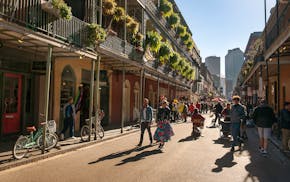A title can speak volumes.
Yale historian Greg Grandin's panoramic, gorgeously crafted "America, América" announces its thesis in a repetition of a single word, with one subtle difference (check out the second "e"). That accent alludes to the fusion of capital and religion as European empires staked their flags in the New World, Indigenous peoples be damned.
The author delves deep into our hemisphere's primary colonial tension: Spain vs. Britain (and later its heir, the United States), Catholicism vs. Reformation-era Protestantism, with Native people and enslaved Africans mowed down in the crossfire. In Grandin's estimation, this "magpie rivalry" gave birth to modern geopolitics.
Dominican friar Bartolomé de las Casas dominates the early chapters; upon his 16th century arrival in Hispaniola he recoiled from the gory brutality of the conquistadores and called on his fellow Spaniards to cease slaughtering natives and dispossessing them of their lands. His writings inspired latter-day liberators, among them Thomas Jefferson and Simón Bolívar.
After subjugating the Aztecs and Incas, Spain consolidated widespread control, eventually challenged by British colonists along the eastern coast of North America. The hemisphere became a pawn in the game of great powers as shifting alliances between monarchies shaped events. Grandin lacquers his book with gritty detail — battles and beheadings, earthquakes and religious strife — yet beneath his textured narrative he metes out a compelling argument: America, in open conflict with América.
Enter the United States, the first republic in the New World. John Jay bargained for an ambitious western boundary, "the pulling out of a sketchy map, the tracing of a line with a finger, the partitioning of the earth as if it were cake."
Although wise to the young country's vices, Venezuelan patrician Bolívar modeled his vision of Latin American self-government on the U.S., quickening anti-royalist sentiment from Quito to Caracas, the angels and demons of human nature jousting amid the stage of nation-building.
"There's a sense, reading the public and private writings of independence leaders, that the Spanish Empire had driven them mad, that it had entered their dreams like some kind of minotaur," Grandin notes. "The half-human, or humanist, part pulled along a mountain of law books and philosophical treaties insisting that all existence, all humanity, was one. The other monstrous half rampaged through history, leaving corpses in its wake."
In Grandin's telling, the U.S. is the larger minotaur. "America, América"' limns the intrigues and betrayals Latin America countenanced as the Civil War roiled and emancipations erupted. Native people were reduced to ghost populations, fenced within reservations.
There are villains aplenty — William McKinley and Woodrow Wilson, for instance — and authentically democratic figures such as FDR and his vice president, William Wallace, who thought World War II couldn't be won without progress for all peoples.
"For the vice president this came down to one thing: raising the world's standard of living," Grandin observes. "If full employment with decent pay wasn't made universal, then fascists, even if they were defeated in war, would regroup." The parallels to our own moment couldn't be timelier.
The author's chapter on the 1948 assassination of Colombian politician Jorge Gaitán is particularly immersive, resonating in the fiction of writers like Gabriel García Márquez and Juan Gabriel Vásquez. "America, América" then, is a vital reimagining of history and cultures, a vigorous study of the past and an uneasy glance toward a future in which no country emerges unscathed.
Hamilton Cain, who also reviews for the New York Times Book Review and Washington Post, lives in Brooklyn, N.Y.
America, América: A New History of the New World
By: Greg Grandin.
Publisher: Penguin, 737 pages.

For 'Legally Blonde' star, 'being underestimated is her secret superpower'

Restaurant openings and closings in the Twin Cities

24 terrific books for the beach, cabin or lawn chair you'll want to read this summer

Worth It podcast: Prince week, a giant pencil, pool parties and women's sports

